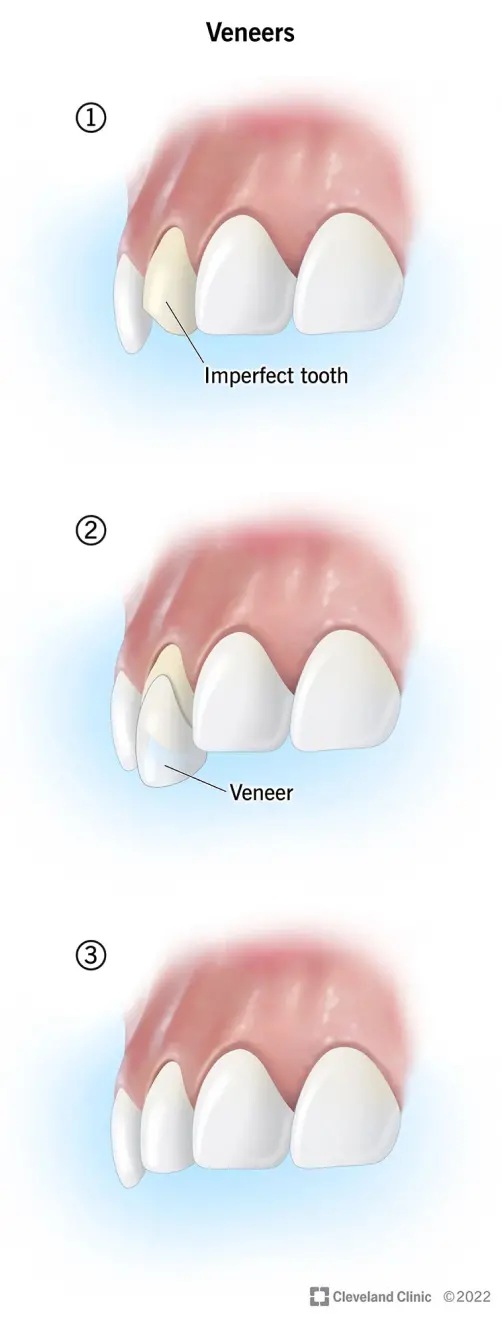
Dental veneers treatment Las Vegas
If you’re ready for a beautiful way to strengthen your smile— dental veneers may be the perfect solution. Explore what’s possible with veneers.
What are veneers?
If you want to improve your smile, dental veneers are a simple option. Veneers are thin coverings that are placed over the front part of your tooth that look like natural teeth. Veneers can be used to correct a wide range of dental issues, including stained, chipped, crooked or damaged teeth. They can even help conceal uneven spaces between teeth.
Types of veneers
Veneers are a solution that enhances both the strength and look of your smile. There are several types of veneers, each with its own benefits:
Porcelain veneers
Porcelain veneers are thin shells made from high quality ceramic. They’re strong, durable, and resistant to staining—making them a popular choice. Your Celebrate Dental care team will carefully create them to match the natural color and shape of your existing teeth.
Composite resin veneers
These veneers are made from a tooth-colored resin material. A benefit to composite resin veneers is that your dentist can sculpt, apply and polish them—all in just one appointment. Composite resin veneers are a bit more economical, although they don’t last as long as porcelain.
Lumineers
Lumineers are a specific brand of ultra-thin porcelain veneers. They don’t require any enamel removal and are a great option if you’re looking for non-invasive treatment.
Snap-on-veneers (removable veneers)
Snap-on veneers, also known as clip-on veneers, are a more modern selection. They are custom-made to fit over your existing teeth and can be removed as needed. Snap-on veneers are more affordable than permanent veneers, but they don’t last quite as long.

Veneers vs. crowns
Both veneers and crowns are excellent solutions to enhance the look and strength of your teeth. The key difference is that veneers cover the front of your tooth while crowns encase your whole tooth. Discover your options by clicking the button below.
Veneers procedure
The procedure for applying veneers has several steps. Although unique care varies per patient, here’s a general idea of what to expect:
Veneers cost
The cost of veneers $1204 per tooth. This depends on the type of veneer (porcelain or composite resin), the complexity of the procedure, and your dentist’s expertise and location.
Veneers FAQ’s
How do veneers work?
Veneers work by covering visible dental imperfections or discoloration with a thin layer of porcelain or composite resin. They are custom-made to fit your teeth and instantly enhance your smile’s appearance and strength. This smile solution remedies things like chips, cracks, gaps or misshapen teeth.
How much do veneers cost?
The cost of veneers can range from $583 to $1351 based on several factors. For the most accurate veneers cost, contact your local Celebrate Dental care team. They will assess your specific situation and give you a customized estimate for the procedure.
How much do veneers cost with insurance?
The cost of veneers with insurance varies, depending on things like your dental plan’s coverage, the type of veneers you’re getting as well as your dentist’s location. However, many insurance companies consider veneers a cosmetic procedure and may not cover the costs. It’s important to consult with your dentist for specific policy details and potential out-of-pocket expenses for getting veneers.
What happens before the dental veneerplacement?
During your initial appointment, your dentist will examine your teeth and gums to determine if you’re eligible for veneers. If you’re a candidate, they’ll prepare your teeth by removing small amounts of enamel. Next, they’ll take impressions of your teeth. A dental lab technician will use these impressions to make your custom veneers. (If you choose composite veneers, dental impressions aren’t needed.)
It can take a few weeks for the dental lab to complete your veneers. If necessary, your dentist can place temporary veneers in the meantime. Once the technician finishes your veneers, the lab will ship them to your dentist’s office.
What happens during veneer placement?
During a second office visit, your dentist will check the shape, color and fit of your veneers, then permanently bond them into place using dental cement. Finally, they’ll check your bite and make any necessary adjustments.
If you want to change something about your veneers, like the shape or color, let your dentist know. They’ll work with you and the dental laboratory to ensure that your results are satisfactory.
There’s no downtime following veneer placement. People who receive dental veneers can return to normal activities the same day. You can also eat or drink immediately after your appointment, as long as the anesthesia has worn off.
Do dental veneers require special care?
Brushing, flossing and visiting your dentist regularly are all you need to do to keep your veneers in good working condition. Be sure to use a soft-bristled toothbrush and non-abrasive fluoride toothpaste. Avoid whitening products, as they can scratch your veneers.
To make your veneers last, you should also avoid biting directly into hard or crunchy foods like apples, carrots and tough meats. Cut up these foods and chew them with your back teeth.
Porcelain veneers are stain resistant, but it’s still a good idea to avoid dark-colored foods and beverages, such as berries, red wine, coffee and tea. These foods and drinks can stain your veneers over time.
What are the advantages of dental veneers?
Dental veneers offer a number of benefits. For example:
- Veneers can dramatically enhance the appearance of your smile.
- They blend in with your natural teeth for lifelike results.
- Veneers resist staining better than your natural tooth enamel.
- Dental veneers don’t require any additional maintenance.
- They have a lifespan of 10 to 15 years with proper care.
What are the disadvantages of veneers?
Veneers also come with certain disadvantages. For example:
- You’ll lose at least some of your natural enamel.
- Many types of veneers aren’t reversible.
- Your teeth may become more sensitive to heat and cold.
- It’s possible for a veneer to fall off or become dislodged.
- Dental veneers are cosmetic, so they’re not covered by most insurances.
Do veneers damage your teeth?
No. Veneers don’t actively damage your teeth. However, it’s still possible for the natural tooth structure underneath to decay. Therefore, it’s important to brush, floss and visit your dentist regularly for cleanings.
Are veneers permanent?
Most types of dental veneers are permanent, meaning they aren’t reversible. Some types of veneers, such as no-prep or minimal prep, are reversible.
On average, dental veneers last between 10 to 15 years with proper care and maintenance.
How can I keep my veneers in good condition?
Here are some recommendations for keeping your veneers looking and feeling great:
- Brush at least twice a day with a nonabrasive fluoride toothpaste and a soft-bristled toothbrush.
- Floss between your teeth once daily.
- Use an antibacterial mouthwash twice a day.
- Never use your teeth as tools (such as opening packages or tearing off clothing tags).
- Visit your dentist for routine exams and cleanings.
When should I see my doctor?
If you’re unhappy with the appearance of your smile, dental veneers may be a solution.
Talk to your dentist about your cosmetic concerns and find out if veneers could work for you.
If you already have veneers and something doesn’t feel quite right, call your dentist right away.
Veneers are an excellent way to enhance your smile and boost your confidence — and they could be a solution for you. Before you choose treatment, weigh the pros and cons so you can make an informed decision. Talk to your dentist about your specific cosmetic goals and find out if dental veneers are a good option for you.
Medical references and resources
Veneers: What Are Dental Veneers? Cost, Procedure & Advantages – https://my.clevelandclinic.org/health/treatments/23522-dental-veneers
Dental Veneers: Porcelain Veneer Uses, Procedure, and More – https://www.webmd.com/oral-health/veneers
Dental Veneers: What Are Veneers? – https://www.aspendental.com/services/cosmetic-dentistry/dental-services/dental-veneers/
Dental Veneers: Benefits, Procedure, Costs, and Results – https://www.healthline.com/health/dental-veneers
Dental veneers: Cost, procedure, and results – https://www.medicalnewstoday.com/articles/dental-veneers
Advances in dental veneers: materials, applications, and techniques – PMC – https://www.ncbi.nlm.nih.gov/pmc/articles/PMC3652364/
Veneer (dentistry) – Wikipedia – https://en.wikipedia.org/wiki/Veneer_(dentistry)
Discover more for your smile
Reimagine your smile with veneers
Contact your local Celebrate Dental & Braces care team today to see if veneers can benefit your smile.
Our Doctors’ Affiliations





